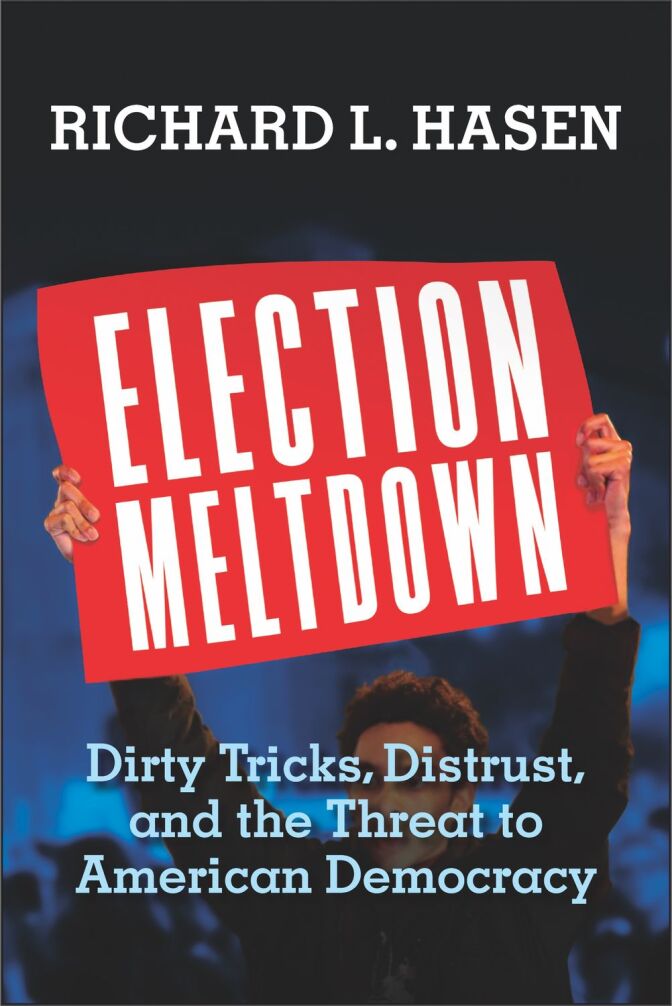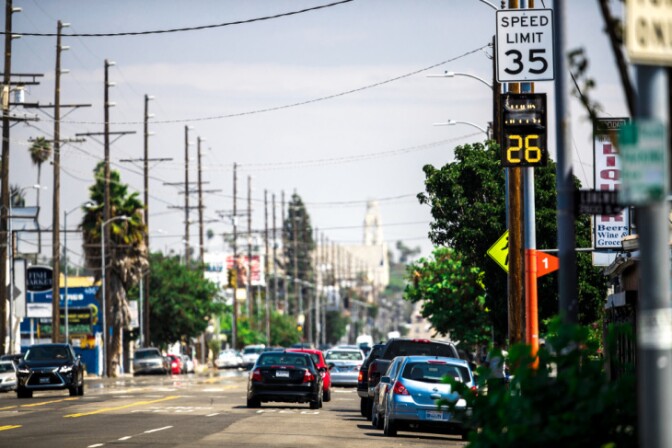Today on AirTalk, we look at the new proposal aiming to give cities more control on managing speed limits. Also on the show, we discuss what efforts can be done to recruit more women firefighters; bring together the Triple Play to talk the rumored changes to the MLB playoff season; and more.
There's A New Push To Put The Brakes On LA's Rising Speed Limits
Years of research, the rules of physics and common sense all point to an established fact about street safety: the faster people drive, the more dangerous and deadly our roads become.
Despite that fact, Los Angeles and other cities across California are regularly raising speed limits on their streets. They're doing that in order to enforce speeding laws in accordance with something called the 85th percentile rule, which roughly says if enough people are driving a certain speed, that should be the speed limit. If that seems like a counterintuitive and incredibly flawed process to make streets safer, a broad coalition of public safety agencies, advocates and lawmakers across the state agrees. And now a new bill introduced in Sacramento aims to give cities more control over how they set and manage speed limits. Today on AirTalk, we look at the pros and cons of the bill and what it could mean for local municipalities.
Read the full story from LAist here.
Guests:
Ribeka Toda, transportation engineer working in Los Angeles; she was on the advisory group that provided input to California’s Zero Traffic Fatalities Task Force
Chad Dornsife, executive director of the Best Highway Safety Practices Institute, a non-profit based in Portland, Oregon; he is a spokesperson for the National Motorists Association on the traffic engineering safety
Economy And Housing Check-In: Southern CA Ahead Of Spring Selling Season
Mortgage rates in the U.S are at their lowest rate in more than three years. This could mean a boost to the market ahead of the spring selling season, according to the Wall Street Journal. But home prices have been rising, including in California.
The L.A. Times reports, home prices this past December were up the most in 19 months. Sales in the state were up by about 22 % from December 2018. Economists have said it shows the market is gaining momentum and that could be attributed to an ease of recession fears and a rise in income levels. Rising home prices spell continued trouble for residents struggling to buy a home in the state.
Today on AirTalk, we check in on the state of the Southern California housing market and discuss what housing experts expect to happen come spring time.
Guests:
Richard Green, housing policy expert; director of Lusk Center for Real Estate at USC; former senior advisor at the Department of Housing and Urban Development under the Obama administration
Christopher Thornberg, founding partner of Beacon Economics, his focus includes economic forecasting, employment and labor markets and economic policy
Firefighting Not A ‘Boys Only Club’: What Is Being Done To Increase The Number Of Female Firefighters?
Increasing the number of female firefighters in the LA City Fire Department has been a long-term goal for Mayor Eric Garcetti. But with the department on track to miss that goal for 2020, it’s stirred conversations on what more can be done to recruit and retain women in the force.
According to the LA Times, only 3.3 percent of the city’s 3,372 firefighters are female, missing the 5 percent goal Garcetti set to hit by 2020. Despite this, the department has been able to slowly build the number of women in their force. There are currently 110 sworn female firefighters in the department compared to 92 in 2013. LAFD battalion chief Kristine Larson cites a visibility issue as the biggest challenge to recruiting more female firefighters. She says that many aren’t aware that firefighting can be a viable career path for women and lack the resources and information on how they can join the force. The department has increased their recruiting efforts, launching publicity campaigns and school outreach programs.
While attitudes towards women in the profession have generally improved, firefighting largely still remains an ‘all boys’ club. The U.S. Bureau of Labor Statistics reported that only about 3.3 percent of firefighters are women nationwide. Fire departments around the country have also been making an effort to diversify and increase the number of women firefighters in their force. In California, many departments, including the LAFD, have launched Girls Camp programs which aims to teach young girls about firefighting.
Today on AirTalk, we look at the challenges fire departments are having at increasing the number of female firefighters in their forces and what is being done to address the issue.
Guests:
Kristine Larson, battalion chief in charge of the firefighter recruitment section for the Los Angeles City Fire Department and board member of Los Angeles Women in the Fire Service, a nonprofit organization that aims to support current and future fire service women and men in the LA area
Amy Hanifan, president of Women in Fire, a non-profit network providing education, support and advocacy for fire service women; operations chief for the McMinnville Fire Department in McMinnville, Oregon
‘Election Meltdown’ Addresses Failures In American Elections, And Where We Go From Here
In recent years, American elections have been marked by reports of voter suppression, problems with election administration, misinformation campaigns and inflammatory rhetoric-- all of which pose a threat to civilian trust in fair elections.

In his new book, “Election Meltdown: Dirty Tricks, Distrust, and the Threat to American Democracy”, election law expert Richard L. Hansen addresses the contemporary and historical perils posed to elections in the U.S. He focuses specifically on how a progressive loss of trust in the electoral process, particularly in the 2016 and 2018 elections, could undermine democracy entirely for future elections. However, Hansen is also concerned with how recent election failures can inform a way forward that is just and democratic. He proposes short-term solutions, like public protests and deference to the courts, as options for ensuring democratic process. He also considers how trusted, old-guard bipartisan leaders (his examples: Colin Powell or Madeline Albright) could step into the spotlight and assure the public of fair election results. But Hansen sees the most potential in longer term solutions, which could include measures to fight voter suppression, fix election administration and combat rhetoric around “rigged” elections that fundamentally destabilize citizens’ trust in the process.
Today on AirTalk, we discuss the state of American elections and the steps the United States should adopt to ensure that fair elections prevail. We want to hear from you. Join the conversation by calling 866-893-5722
Event:
Rick Hasen will talk about his new book, “Election Meltdown” on Wednesday, Feb. 26 at 7:30pm at the Hammer Museum in Westwood. The event is free and open to the public.
Also, he’ll be at the Hammer Museum in Westwood on Wednesday, Feb. 26 at 7:30pm. Both events are free and open to the public.
Guest:
Richard L. Hasen, Chancellor’s Professor of Law and Political Science at the University of California, Irvine and author of the new book “Election Meltdown: Dirty Tricks, Distrust, and the Threat to American Democracy” (Yale University Press, 2020)
Triple Play: How The MLB Might Tweak Its Playoff Format, Plus New Report Explores Astros Sign-Stealing Tool “Codebreaker”
It’s been a busy week for baseball and its fans following the blockbuster trade last week that sent Red Sox outfielder Mookie Betts and pitcher David Price to the Los Angeles Dodgers.
First, the Wall Street Journal published an in-depth piece by baseball writer Jared Diamond looking at the tool that the Houston Astros front office used to steal signs from opposing catchers. The Excel application dubbed “Codebreaker” is detailed in a letter that The Wall Street Journal reviewed which was sent from MLB Commissioner Rob Manfred to the Astros then-general manager Jeff Luhnow. MLB suspended Luhnow and Astros manager A.J. Hinch a little more than a week after the letter was sent, and the Astros summarily dismissed both men from their positions with the organization. “Codebreaker’s” concept was pretty simple -- someone would input data on the signs a catcher was giving and which pitch actually ended up being thrown and the algorithm would spit out information that explained how signs and pitches corresponded with one another. From there, that info could be relayed to the dugout, then to a runner on base and ultimately to the batter at the plate.
Then, on Monday, a new wrinkle appeared in the scandal when former MLB pitcher Mike Bolsinger, who spent some time with the Dodgers, filed suit against the Astros in Los Angeles Superior Court alleging that he was the victim of sign-stealing during a pitching performance in August of 2017 during which he was shelled so badly he lost his MLB job and hasn’t been able to get any offers since. On a completely different subject, Major League Baseball also raised a few eyebrows on Monday when reports surfaced that it was considering changes to its current playoff format that would include expanding the number of teams that qualify from 10 to 14 and even allowing certain teams to choose their first round opponent. The current collective bargaining agreement between the league and players expires in 2021 and any sweeping changes to the playoff format would need to be negotiated, but the proposal drew a mixed bag of reactions from across the league, including from one MLB pitcher who called Commissioner Manfred a “joke” in a
No idea who made this new playoff format proposal, but Rob is responsible for releasing it, so I’ll direct this to you, Rob Manfred. Your proposal is absurd for too many reasons to type on twitter and proves you have absolutely no clue about baseball. You’re a joke.
— Trevor Bauer (トレバー・バウアー) (@BauerOutage) February 11, 2020
.
Today on AirTalk, we’ll convene the “Triple Play” to take a look at the new reporting on the Astros scandal and get reaction on the proposed changes to the playoff format.
Guests:
A Martinez, host of KPCC’s “Take Two”; he tweets
Nick Roman, host of KPCC’s “All Things Considered”; he tweets
A Check In On New Hampshire’s Primary
Democrats are hoping that voters in New Hampshire will reset the party's presidential nomination fight on Tuesday and bring clarity to a young primary season that has been marred by deep dysfunction and doubt.
Since the chaotic Iowa caucuses failed to perform their traditional function of winnowing the race, it now falls to New Hampshire to begin culling the Democratic field, which still features almost a dozen candidates. Former New York City Mayor Michael Bloomberg, who is not even on the ballot, won the votes of a tiny New Hampshire community that barely hung onto its tradition of being among the first to make their picks in the presidential primary. For Vermont Sen. Bernie Sanders, the vote is an opportunity to build on the dominance of the party's left flank. A repeat of his strong showing in Iowa could severely damage progressive rival Sen. Elizabeth Warren, who faces the prospect of an embarrassing defeat in a state that borders her home of Massachusetts. Today on AirTalk, we get the latest updates from the ground in New Hampshire.
With files from the Associated Press
Guest:
Trent Spiner, Politico reporter covering the New Hampshire primary; he tweets




